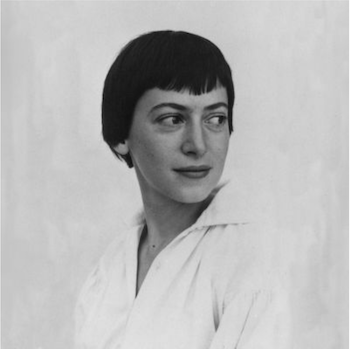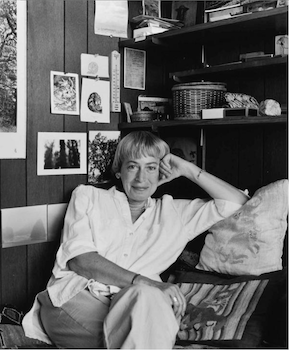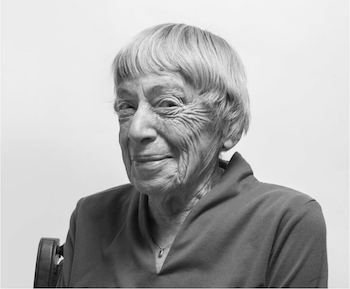
Ursula K. Le Guin, born October 21, 1929, in Berkley, California was an American science fiction and fantasy writer. Le Guin was raised by her two parents - a writer named Theodora and a celebrated anthropologist named Alfred. Louis Kroeber - and was the youngest daughter of four siblings. Additionally, she was raised in a family where art and culture were regularly discussed, with her father being especially interested in Native American culture as his field of study. Therefore, values her father instilled in a young Le Guin through his study of the destruction of Native American tribes led Le Guin to have a deep passion for exploring and appreciating cultures different from her own. Le Guin’s writing reflected this sentiment, as her books often centered on characters who were “alone of their kind among people of another kind,” as she herself observed (National Endowment for the Humanities).
Le Guin submitted her first story to the magazine Astounding Science Fiction when she was only 11 years old. Although it was rejected, this didn’t discourage her from following her passion to write. Le Guin, like many aspiring writers, grew up reading books while attending public highschool in Berkley. She did not just read American books, but also Russian, French, and English literature. Within the pages of a novel set in Moscow in 1812, she found refuge, more than she did in Berkeley. She went on to attend Radcliffe College and conducted graduate work at Columbia University, and majored in French literature. Although she enjoyed studying French literature, the main purpose of going to school was for her to become a teacher and earn a living so she could start writing on the side. Her very first novel attempt followed a family in an imaginative European country. However, Le Guin later felt she knew too little about European history and people to be writing about them, so the novel was scrapped after being rejected by the first publisher she sent it to. In 1959, she began publishing short stories and poems, but it was not until 1966 that she published her first novel, Ranconnon’s World.
When Le Guin started publishing, the sci-fi world was dominated by so-called “hard science” writing; books that claimed to be grounded in chemistry, physics, and biology. Science fiction books were written by, for, and about white men with little gender or racial diversity. Le Guin originally wrote books mostly from male-perspectives, as this was the norm during the 1960s, but by the 1970s, she began more freely exploring female-perspectives following the success of her writing. This transition was absolutely vital to her continuation as a writer, Le Guin believed, because she learned how to write from her “own being” as a woman instead of trying to adapt her ideas into the male-perspective.

In the late 1960s, Le Guin’s writing career took off when her novel Wizard of the Earthseas (1968) gained commercial success. The islands of Earthsea, the setting of the book, consisted of people who were all non-white; a revolutionary idea for the time. In 1969, she followed up Wizard of the Earthseas with The Left Hand of Darkness. This novel was culture-shocking and challenged the status quo of science fiction at the time by imagining a world where the inhabitants had no fixed gender and reconceived the way in which society framed gender roles as “inherent” or “natural”. The Left Hand of Darkness won her both the Hugo and Nebula awards of 1969 for best novel, and Le Guin became the first woman to do so. Other novels, such as The Dispossessed (1974) and The Ones Who Walked Away from Omelas (1973) subtly and not so subtly hold themes of anarchism - reflecting the influences of thinkers such as William Godwin and Peter Kropotkin on Le Guin’s writing. In addition to these authors, Charles Dickens, Virgina Woolfe, Leo Tolstoy, and Jorges Luis Burges were some of the writers beloved by Le Guin who influenced her work.
Le Guin has won numerous awards, including eight Hugo Awards, six Nebula Awards, and the 1973 National Book Award for Young People’s Literature for The Farthest Shore. Nebula Awards annually recognize the best works of science fiction or fantasy in the United States, and the Hugo Award is annually given to the best science fiction or fantasy literary achievements from the year prior at the World Science Fiction Convention. Later on, in 2009, the Library of Congress recognized Le Guin as a “Living Legend” in the “Writers and Artists” section for her contributions to American culture. In 2014, she was awarded the “National Book Foundation Medal for Distinguished Contribution to American Letters” and gave a passionate speech about commerce, freedom, and art. In her speech she stresses the importance of writers in society, and their ability to write freely.

“Hard times are coming, when we’ll be wanting the voices of writers who can see alternatives to how we live now, can see through our fear-stricken society and its obsessive technologies to other ways of being, and even imagine real grounds for hope. We’ll need writers who can remember freedom — poets, visionaries — realists of a larger reality.” - Ursula K. Le Guin, 2014
On a steamboat headed for France in the fall of 1953, Le Guin met her husband, historian Charles Le Guin, and married him that very winter. They settled in Portland, Oregon together and had three children named Elisabeth, Caroline, and Theodore. Taking inspiration for her own fantasy landscapes from the Oregon nature, Le Guin valued her home there tremendously. She taught writing workshops all over the world and was very active in her local Oregon community. Le Guin saw her job as a writer as more than just delivering stories. She strived to evoke open ended questions that allowed for nuanced conversation among readers. Her writing was heavily influenced by and evoked the ideas of Carl Jung, Taoism, and cultural anthropology.
Ursula K. Le Guin died in Portland on January 22nd, 2018 at the age of 88 from complications due to age. Her legacy continues to live through the new generation of science fiction writers - such as Neil Gaman and Salman Rushdie - as well as great creative directors such as Hayao Miyazaki. Le Guin set a precedent for the science fiction world to adapt into a more inclusive and free space for writers to explore and question the values and norms of society. She regularly pushed for the recognition of women in the science fiction field, and wasn’t afraid to confront men in the field about their exclusivity. Le Guin refused to back down in the face of adversity, and the result was a more accepting space for writers to cover the topics that mattered to them.
Why Did I Choose to Research Ursula Kroeber Le Guin?
I was first introduced to Le Guin when I read her book, The Left Hand of Darkness, and was completely taken aback with her ability to create fantasy worlds and the way in which she challenged the gender binary at such a rigid point in history. I continued to read her work and became more and more enraptured with her ideas and the pure ability of her writing. I began bringing her up in conversations to people all the time, but noticed there was a lack of knowledge about her. Some people would recognize her name vaguely, but no one was familiar with the deep impact she had on the writing world. Specifically, I noticed a lack of acknowledgement from younger people - which made me sad because I don’t want to see Le Guin lost to history. She paved the way for so many influential and groundbreaking authors of our time, and she deserves the recognition she fought for in the early 1970s and 80s.
Works Cited
Clute, J. (2018, January 24). Ursula K Le Guin obituary. Retrieved July 8, 2024, from the Guardian website: https://www.theguardian.com/books/2018/jan/24/obituary-ursula-k-le-guin
Guin, U. K. L. (2016, September 15). My Motherland. Retrieved July 8, 2024, from The Paris Review website: https://www.theparisreview.org/blog/2016/09/15/my-motherland/
Hobbs, C. (2022, September 7). Who Was Ursula K. Le Guin? Retrieved July 8, 2024, from BOOK RIOT website: https://bookriot.com/who-was-ursula-k-le-guin/
Le Guin, U. K. (n.d.). Ursula K. Le Guin — The National Book Foundation Medal for Distinguished Contribution to American Letters. Retrieved July 8, 2024, from Ursula K. Le Guin website: https://www.ursulakleguin.com/nbf-medal
Mayer, P. (2018, January 24). The Influence Of Ursula K. Le Guin. Retrieved July 8, 2024, from NPR.org website: https://www.npr.org/2018/01/24/580107623/the-influence-of-ursula-k-le-guin
Phillips, J. (2019a). Ursula K. Le Guin Was a Creator of Worlds. Retrieved July 8, 2024, from The National Endowment for the Humanities website: https://www.neh.gov/article/ursula-k-le-guin-was-creator-worlds
Phillips, J. (2019b). Ursula K. Le Guin Was a Creator of Worlds. Retrieved from The National Endowment for the Humanities website: https://www.neh.gov/article/ursula-k-le-guin-was-creator-worlds
The incredible love story of two Alumni (1953/54) : Ursula K. Le Guin & Charles Le Guin | Commission Franco-Américaine Fulbright. (n.d.). Retrieved July 8, 2024, from fulbright-france.org website: https://fulbright-france.org/en/incredible-love-story-two-alumni-1953-54-ursula-k-guin-charles-guin
Ursula K. Le Guin. (2018, January 24). Retrieved from Biography website: https://www.biography.com/writer/ursula-k-le-guin
Ursula K. Le Guin. (2024, June 21). Retrieved July 8, 2024, from Wikipedia website: https://en.wikipedia.org/wiki/Ursula_K._Le_Guin#:~:text=She%20won%20eight%20Hugo%20Awards
Ursula K. Le Guin (1929–2018). (2022, June 30). Retrieved from www.oregonencyclopedia.org website: https://www.oregonencyclopedia.org/articles/le_guin_ursula_1929_/
Ursula K. Le Guin - Author. (n.d.). Retrieved from Ursula K. Le Guin website: https://www.ursulakleguin.com/
Ursula K. Le Guin | American Masters | PBS. (n.d.). Retrieved July 13, 2024, from American Masters website: https://www.pbs.org/wnet/americanmasters/masters/ursula-k-le-guin/
Ursula K. Le Guin | Biography, Books, & Facts. (n.d.). Retrieved from Encyclopedia Britannica website: https://www.britannica.com/biography/Ursula-K-Le-Guin
Ursula K. Le Guin — Bibliography. (n.d.). Retrieved July 8, 2024, from Ursula K. Le Guin website: https://www.ursulakleguin.com/bibliography
Wray, J. (2013). The Art of Fiction No. 221. Retrieved July 8, 2024, from www.theparisreview.org website: https://www.theparisreview.org/interviews/6253/the-art-of-fiction-no-221-ursula-k-le-guin
This article was published on 8/2/24